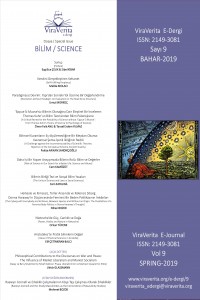Abstract
Geleneksel
bilim anlayışının birikimsel olarak ilerleyen bilim tanımına karşı Thomas
Kuhn’un öne sürmüş olduğu “bilimsel kuramların eş-ölçülemezliği” tezi, ardışık
bilimsel paradigmaların ortak bir ölçüte sahip olmadığını ve birbirlerine
tercüme edilemeyeceğini ifade eder. Öte yandan Donald Davidson, eş-ölçülemezlik
tezine karşı güçlü bir argüman geliştirmekte ve paradigma veya kavramsal şema
ile bu şema tarafından yorumlanmayı bekleyen içerik ikiliğine karşı
çıkmaktadır. Ona göre farklı kavramsal şemalardan söz etmek tutarsızdır, zira paradigmalar
arası tercümenin mümkün olduğu durumlarda farklı kavramsal şemalar söz konusu
değildir. Tercümenin mümkün olmadığı durumlarda ise tercüme edilemeyen şeyin bir
dil olduğunu iddia etmek yanlıştır. Bu nedenle eş-ölçülemezlik tezi
savunulabilir değildir. Ancak Davidson’un argümanları itiraz edilemez değildir.
Özellikle “tercüme” ve “yorumlama” kavramlarının arasındaki farkın altını
çizerek bu itiraza karşı çıkmak mümkündür.
References
- Baghramian, M. (1998). Why conceptual schemes?. In Proceedings of the Aristotelian Society (pp. 287-306). Aristotelian Society.
- Davidson, D. (1973–1974). On the very idea of a conceptual scheme. Proceedings and addresses of the American Philosophical Association, 47, s. 5–20
- Hacker, P. M. (1996). On Davidson's idea of a conceptual scheme. The Philosophical Quarterly (1950-), 46(184), 289-307.
- Kitcher, P. (1982, J). Implications of incommensurability. In PSA: Proceedings of the Biennial Meeting of the Philosophy of Science Association (Vol. 1982, No. 2, s. 689-703). Philosophy of Science Association.
- Kuhn, T. S. (1982). Commensurability, comparability, communicability. In PSA: Proceedings of the biennial meeting of the Philosophy of Science Association (Vol. 1982, No. 2, s. 669-688). Philosophy of Science Association.
- Kuhn, T. S. (1996). The structure of scientific revolutions. University of Chicago press.
- Malpas, Jeff (2015). "Donald Davidson", The Stanford Encyclopedia of Philosophy (Fall 2015 Edition), Edward N. Zalta (ed.), URL = <https://plato.stanford.edu/archives/fall2015/entries/davidson/>.
- Sankey, H. (1990). In defence of untranslatability. Australasian Journal of Philosoph-y, 68(1), 1-21.
Abstract
References
- Baghramian, M. (1998). Why conceptual schemes?. In Proceedings of the Aristotelian Society (pp. 287-306). Aristotelian Society.
- Davidson, D. (1973–1974). On the very idea of a conceptual scheme. Proceedings and addresses of the American Philosophical Association, 47, s. 5–20
- Hacker, P. M. (1996). On Davidson's idea of a conceptual scheme. The Philosophical Quarterly (1950-), 46(184), 289-307.
- Kitcher, P. (1982, J). Implications of incommensurability. In PSA: Proceedings of the Biennial Meeting of the Philosophy of Science Association (Vol. 1982, No. 2, s. 689-703). Philosophy of Science Association.
- Kuhn, T. S. (1982). Commensurability, comparability, communicability. In PSA: Proceedings of the biennial meeting of the Philosophy of Science Association (Vol. 1982, No. 2, s. 669-688). Philosophy of Science Association.
- Kuhn, T. S. (1996). The structure of scientific revolutions. University of Chicago press.
- Malpas, Jeff (2015). "Donald Davidson", The Stanford Encyclopedia of Philosophy (Fall 2015 Edition), Edward N. Zalta (ed.), URL = <https://plato.stanford.edu/archives/fall2015/entries/davidson/>.
- Sankey, H. (1990). In defence of untranslatability. Australasian Journal of Philosoph-y, 68(1), 1-21.
Details
| Primary Language | Turkish |
|---|---|
| Journal Section | Articles |
| Authors | |
| Publication Date | May 31, 2019 |
| Submission Date | March 1, 2019 |
| Published in Issue | Year 2019 Issue: 9 |


